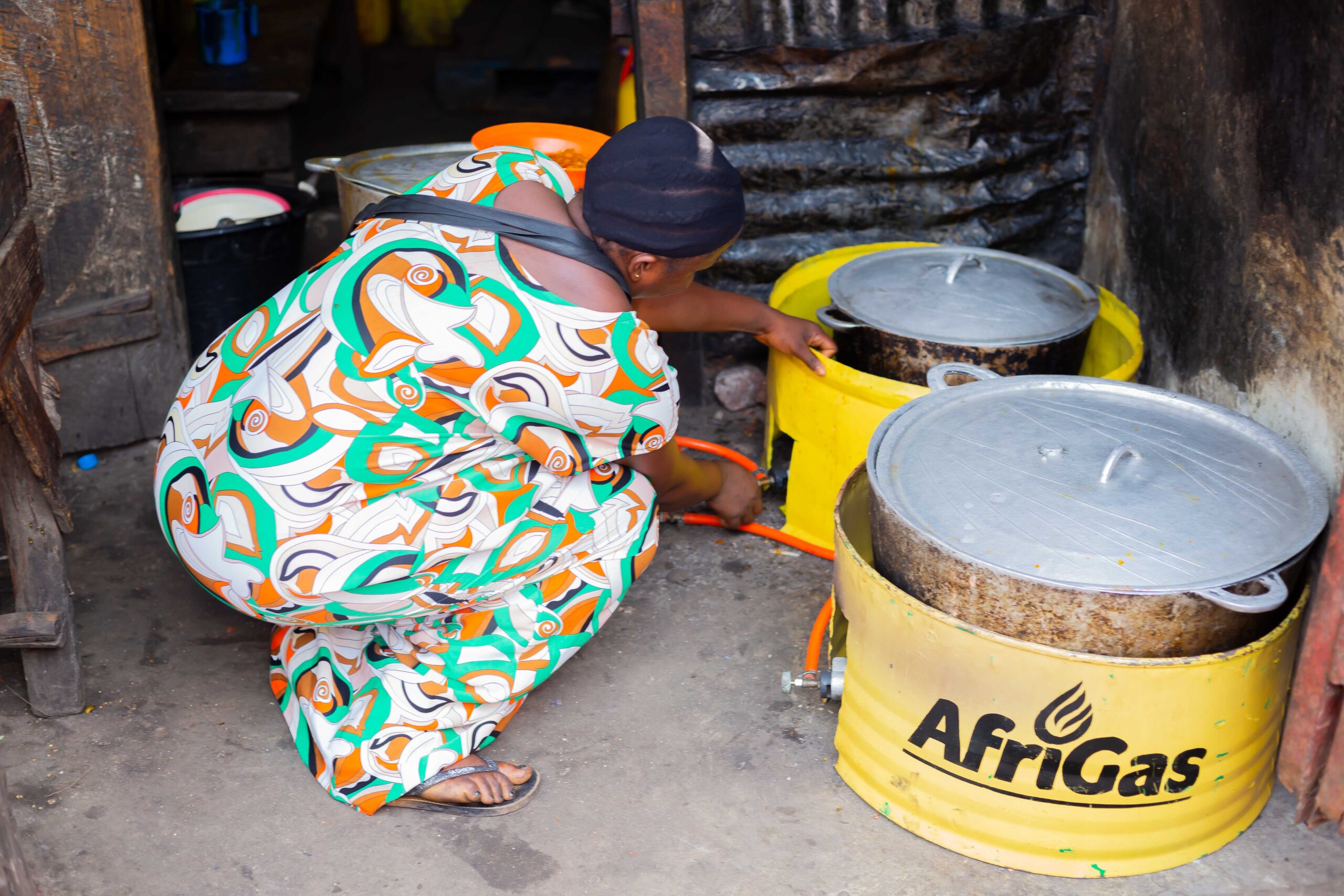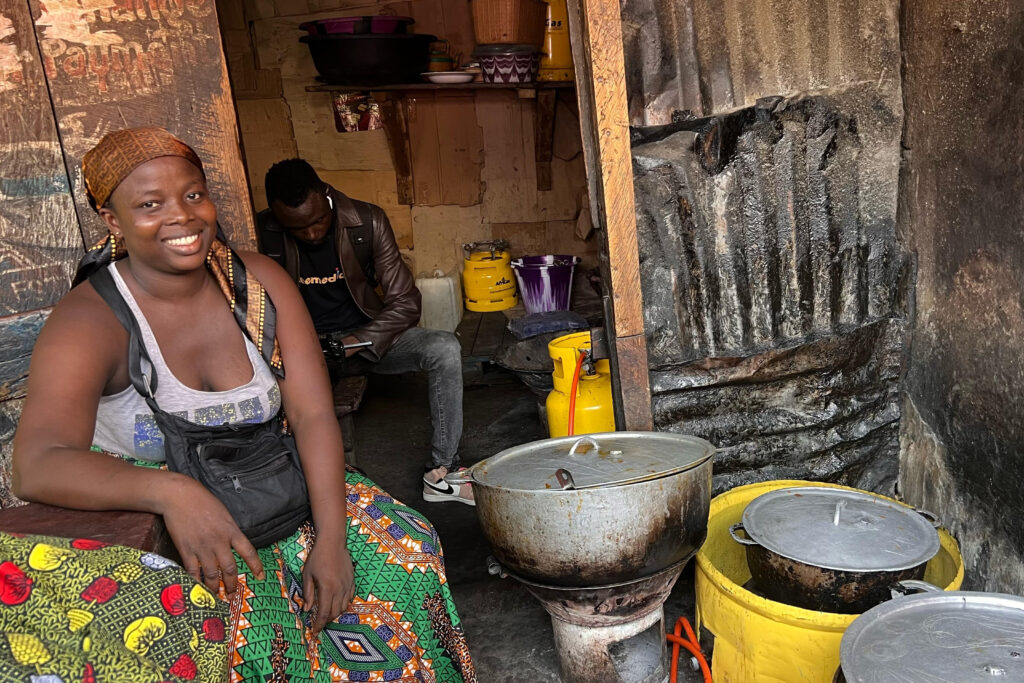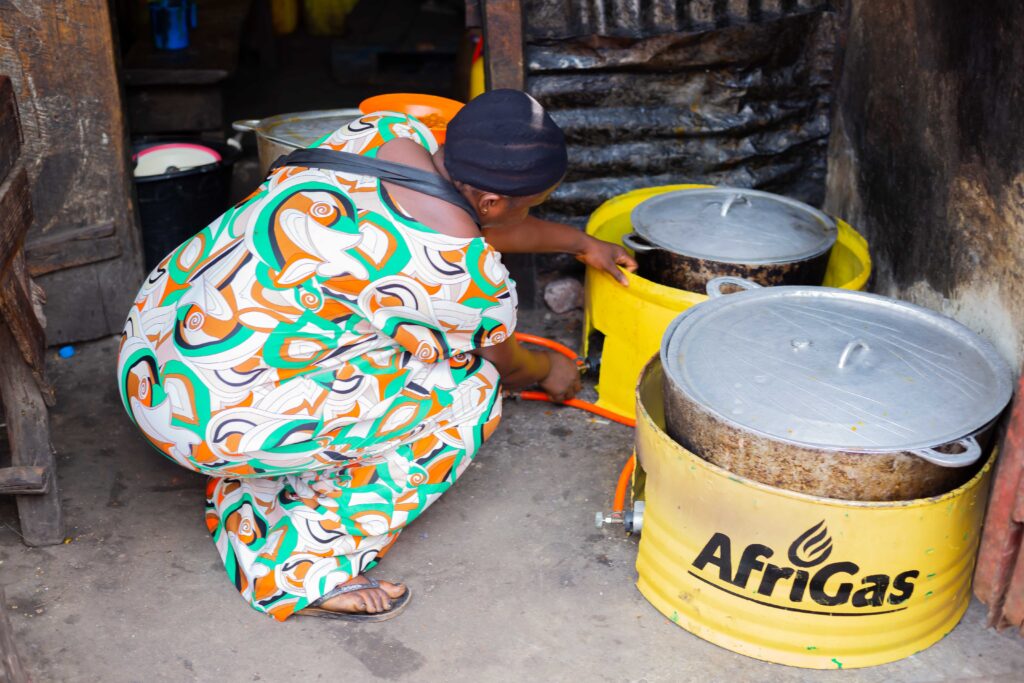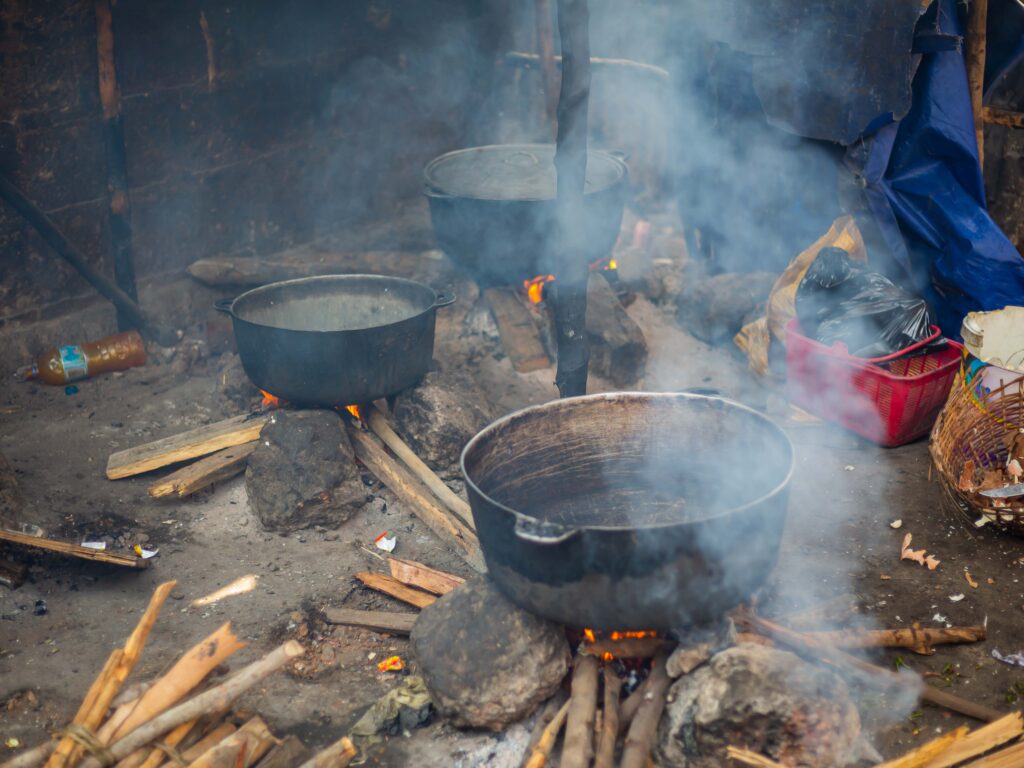16 August 2024
Clean cooking in Sierra Leone: How the spark of an idea can ignite big changes



There was a time when cooking brought tears to Fatima Bangura’s eyes. It wasn’t necessarily the ingredients that went into the 25-year-old’s culinary creations. Or pride that her popular dish of cassava leaves and beans draws customers back to her food stall in Susan’s Bay, an informal settlement in Sierra Leone’s Freetown. The real culprit? Smoke from the charcoal stove.
And so, when in December 2023 Fatima came across a demonstration by a Sierra Leonean company, Afrigas SL, on how to use a liquefied petroleum gas (LPG) cylinder for cooking, it sparked her curiosity. Compared to Fatima’s usual time-consuming and potentially hazardous method of lighting a stove – using embers from a neighbour or burning plastic bags to ignite the charcoal – she saw that using gas was quicker, safer, cleaner and more efficient. She swiftly signed up and hasn’t looked back.

“Using charcoal previously caused me a lot of challenges, especially with the heat, and the smoke that irritated my eyes. These reasons made me switch,” says Fatima.
Fatima was an early adopter of LPG as part of a project to increase access to clean cooking for households and micro-enterprises in urban informal settlements, such as Susan’s Bay and its surrounds. Called ‘ENACT’ (Enabling African Cities for Transformative Energy Access), the project is implemented by ICLEI Africa and Energy 4 Impact in Freetown and Kampala, thanks to funding from the UK government via the Transforming Energy Access platform.
Clean cooking can be defined as a combination of stove technologies and fuels that are more efficient and produce lower pollutants at levels in line with the World Health Organisation’s guidelines. In Sierra Leone, biomass – typically wood and charcoal – accounts for over 95% of the country’s cooking energy sources. In Susan’s Bay, one of Freetown’s largest informal settlements, that figure goes up to 99% of households. The community’s ‘cookery sellers’ – business owners like Fatima who cook and sell food – invariably rely on charcoal, firewood or a combination of both. While traditional cooking practices are woven into the fabric of life across the country, they also result in several negative impacts.
Household air pollution can severely affect people’s health, with multiple threats including cardiovascular diseases, chronic respiratory or eye conditions, and adverse pregnancy outcomes. Since women do most of the cooking, often with their children nearby, they are disproportionately affected.
In addition, it is estimated that 77% of charcoal users in sub-Saharan Africa live in cities, underscoring the extent to which urban areas are driving deforestation. The black carbon produced through burning biomass is also a major contributor to global warming and climate change. In communities such as Susan’s Bay, where some 4,500 people live in a densely packed network of makeshift tin shacks, there is a very real risk of fire breaking out from use of traditional biomass and spreading rapidly.
And yet despite these risks, people often have no option but to keep burning wood and charcoal in these inefficient ways, particularly in areas like Susan’s Bay where weak infrastructure does not deliver adequate or affordable essential services. Such communities also live on low and irregular incomes. While fuel costs consume a large part of many people’s monthly incomes, residents can at least buy charcoal and firewood daily in small amounts, and vendors are usually no more than a 15-minute walk away.
Recognising these barriers to cleaner cooking solutions in informal settlements, ENACT appointed private companies to trial new ‘last-mile’ (the last part of a product’s journey to the consumer) delivery models and approaches in Freetown and Kampala, Uganda. By identifying successful solutions in these two locations, the idea was that they could be scaled up and replicated in informal settlements in other African cities.
[Photo source: InkeeMedia]
And so it was that ENACT engaged private company Afrigas, a leading LPG filling and distribution company in Sierra Leone, to pilot their products in Susan’s Bay and surrounding settlements. Afrigas’s approach was very much geared around discovery, refining their product offerings and marketing strategies along the way through ENACT funding. For example, Afrigas was surprised to learn that many households in Susan’s Bay do not cook every day but rely on cookery sellers like Fatima, hence the inclusion of this group.
Armed with insights such as this, Afrigas ran a marketing and awareness raising campaign on the benefits of clean cooking solutions. This included flyers, radio and TV shows and some 30 awareness-raising events, from door-to-door demonstrations on the safe use of LPG to campaigns highlighting benefits to the user.
Afrigas worked to address people’s concerns, including the fear from landlords that the gas could cause explosions. They tackled cultural barriers and challenged scepticism. As Sahid Swahid, General Manager of Afrigas says:
“We had to do a lot of sensitisation because there’s the perception that gas can be dangerous. But we asked people to use the product, and just by using the product we were able to convince them very, very clearly of the comfort that they can have. Of course, we provided a lot of safety training as well in the process.”
Afrigas also ensured that refilling LPG canisters is as quick and convenient as purchasing charcoal or firewood, by providing access through local vendors, their Head Office, and community ambassadors.
While uptake of the gas canisters and stoves has been something of a slow burn – as of July 2024, there have been 107 new LPG gas cylinder connections in Susan’s Bay informal settlement and surroundings – findings from the field have shown that Afrigas is slowly but surely beginning to change people’s views and lives.

Fatima is certainly a convert. Since first using her new gas stove at the start of the year, she has seen many benefits. Fatima says the air quality when she cooks is better, helping to improve her health, and she has saved time.
“I spend less than two minutes [lighting the gas], unlike charcoal which takes more than 15 minutes on a daily basis.”
The food also takes less time to cook. Fatima adds: “Previously, I normally spent three hours preparing food, now with the LPG I barely spend one-and-a-half hours to prepare the same food.” While Fatima is cooking the same amount she used to on the new stove, the quicker process attracts more customers and she can warm up dishes throughout the day.
On average, users of the gas stoves can save up to SLE 400 a month (just over £14). Fatima says she can cook for around eight days before needing to refill her canister at a cost of SLE 440 (£15.40). This translates to a daily cost of SLE 55 (around £1.90) compared to the SLE 70 (over £2.40) she used to spend on charcoal. Another benefit is less disagreement with her neighbours. Fatima comments: “They no longer accuse me of emitting soot that soils their property…”

One factor with the gas stoves that has proved a major hurdle is the upfront cost, which is why ENACT is helping companies build partnerships with microfinance institutions. As Yvonne Aki-Sawyerr, Mayor of Freetown, says: An LPG cylinder costs more than the annual rent of a slum dweller in Freetown, so we need more affordable and sustainable clean cooking solutions that have a positive impact on these people’s livelihoods.
Fatima couldn’t afford the initial SLE 1,000 payment (just over £35) for a 12kg LPG gas cylinder with double burner but her sister, who runs a nearby kiosk, offered to cover half. Fatima then paid back the rest of the money in weekly instalments of SLE 200 (almost £7) to an Afrigas vendor.
Afrigas, through its field activities, has mapped about 550 households that expressed interest in accessing an Afrigas product through a microloan. To make LPG more accessible, Afrigas plans to offer flexible payment plans and loan options, partnering with leading microfinance institutions such as BRAC Microfinance to offer credit.
Through ENACT, the company has also developed a ‘shared canister’ model, whereby neighbours can share an LPG canister or an individual can rent it out for community events.
With an eye to the fact that more than 950 million Africans, particularly those living in sub-Saharan Africa, lack access to clean cooking solutions, there is enormous potential to scale similar approaches in other cities in Sierra Leone and beyond.
Back in Susan’s Bay, Fatima, with 10 years under her belt as a cookery seller, also has plans to expand her operations. She’d like a bigger restaurant and better plates. She also hopes others in her community will get on board with the gas stoves.
“The benefits are clear and I believe more people will adapt to it over time,” she says.
As Fatima’s picture is taken next to her gas stove, a pot heralding her next customers and the chicken or fish stew they might enjoy, a smile spreads across her face. No teary eyes here.
Find out more
To hear the stories of residents and cookery sellers in Freetown and Kampala who have adopted LPG, watch these videos:
Improving clean cooking access in Freetown (Sierra Leone)’s informal settlements
Improving clean cooking access in Kampala (Uganda)’s informal settlements
In June 2024, Energy 4 Impact and ICLEI Africa co-hosted a webinar which brought together clean cooking companies, policymakers, city planners and industry leaders to share their experiences of collaborating through ENACT. For further context on the ENACT intervention, including partnerships forged with national and local governments to build an enabling environment for clean cooking initiatives, read our account of the webinar or watch the recording.
Visit the ENACT project webpage to learn more about the work being done to promote clean cooking in Africa’s urban informal settlements.
ENACT is part of the Transforming Energy Access (TEA) platform, funded with UK aid from the UK Government; it is managed by the Carbon Trust and delivered by ICLEI Africa, in collaboration with Mercy Corps – Energy 4 Impact.
*This article was originally published on the Mercy Corps – Energy 4 Impact we



